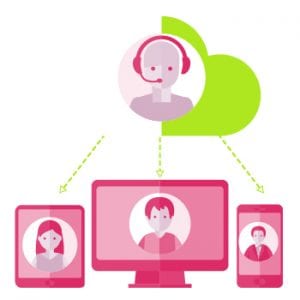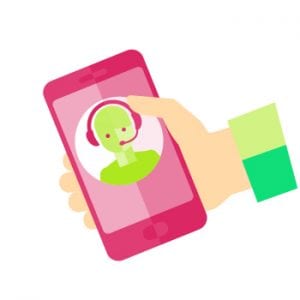
Real-Time Translation vs Phone Interpreting App
Humans need each other to survive in this world. But they speak different languages, and sometimes they forget that that can be a problem. It is only when they have to communicate with someone who doesn’t speak the same language as them that they realize the problem. But fortunately, we have the solution to language barriers in the form of translation services. However, there is a lot that people don’t know about language services. It is important for people to know the difference between linguistic problems and their solutions so they can hire the right professional. It can also help them figure out the winner between real-time translation vs. phone interpreting app.


What is Real-Time Translation?
When you order the translation of a document, there is a high chance that you will get it in twenty-four hours. But sometimes, people can’t wait that long. There are agencies that offer urgent services to help their customers. However, a better solution is a real-time translation where people can get the help they require in real-time. Apps like Google Translate offer real-time solutions to allow users to communicate with each other easily. You can use your device to communicate with a person who doesn’t speak the same language as you.
Thanks to translation apps like Google Translate and Microsoft Translator, real-time translations have become very popular. Users can get the result they require within seconds. Apps also display the translated sentence so it can be reviewed by users. You can also check the pronunciation of each word in the text.
What is Phone Interpreting?
Sometimes, people require linguistic solutions, but not the kind that would take them to a translator. They need results in real-time. If you are having a conversation with someone who speaks a language different than yours, you will need the services of an interpreter so you can understand them. Depending on your requirements, you can get different types of interpretations. In any case, it is the type of linguistic solution you can get in real-time.
Nowadays, modern devices have become an inseparable part of our lives. We cannot go a day without our smartphones, and that’s where modern interpreting comes in. It is the type of interpreting you can get over the phone. You can book an interpreter for a meeting with foreign clients. Once they come over the phone, they will interpret the conversation. Telephone interpreting is very helpful as it gives people privacy and the assistance they require at the same time. Nowadays, there are apps that offer to connect you with human interpreters over the phones. But it is not always an ideal situation as you may not always be able to find a qualified interpreter.
Real-time Translation Vs Phone Interpreting Apps
Machine translation has changed the game for both linguistic experts and people in need of language services. Nowadays, everyone has Google Translate on their phones. But there is still a lot that needs to be discussed about translation apps. Although they have a lot of useful features, they still lack in many aspects. There are also so many options available that people find it hard to figure out which one is the right choice. But when it comes to real-time translation vs. phone interpreting app, the answer depends on your requirements.
Both translation and interpretation have their own uses. When you are using an app to translate a message, you don’t need results in real-time. But if it is speech, then you will need to know the translation as quickly as possible. In such a situation, both real-time translation and interpretation work fine. However, a phone interpreting app can connect you with a personal interpreter. A human expert can provide you with an accurate interpretation as compared to a machine. But if you are using a voice translator to get results in real-time, they may not be hundred percent accurate.
If you are speaking to someone face-to-face, then real-time solutions are better. You can pick the source and target languages within the app and then get results once one of you starts talking. If you are using an app, you can also translate an image with its help. But an app might not help you much with different dialects. On the other hand, an instant phone interpreter can provide you with better solutions. You can get the interpretation of dialects and not just the standard languages. If an app can connect you with language interpretation professionals, then it is definitely better than the app that provides you with real-time translation. If you’re looking for mobile translation services, check this out.


Machine vs. Human Experts
When it comes to languages, no one will be able to know them better than humans. It is true that our phones nowadays are very smart. And we have websites that can help us with any problem. But technology has many limits. Professional interpreters and translators will always know more about languages than machines. Machines cannot understand the cultural aspects of languages. You can turn to Google Translate to find out the meaning of simple phrases. But you will need human translation when you are applying for immigration.
Language interpreters are qualified to provide linguistic services in real-time without making any mistakes. But you cannot expect the same from an app like Google Translate. Even if it supports multiple language pairs, it won’t be able to offer you a hundred percent accuracy. You can get phone interpreter services from a language service company when you require accurate results instead of turning to an app. When companies require language interpreting, they cannot count on Google Translate. They will only get accurate results by hiring human experts.
So, we can appreciate Google Translate for its features including offline translations and voice support. But we must remember that human experts will always be superior to smartphone apps. So, whenever you require accurate linguistic solutions, you should hire human experts instead of turning to Google Translate.
Why a Translation Device is Better than an App for Traveling?
Advancements in translation technology have resulted in the popularity of translation devices. You can get voice translations on the move whenever you want. A lot of travelers use these devices. But there are many typical app users that are not familiar with these devices. Although Google Translate can be helpful for travelers, it is not better than a device.
There are modern devices that not only offer linguistic solutions without the internet but also come with advanced features which allow them to listen to speakers even in noisy rooms. They also have better speeds of translating phrases. You can download language packs once and never have to wait for data again. Another great thing about these devices is that they are available at affordable prices. You can check out the available devices and you will be able to find one that suits your budget easily.
Apps come up with a lot of limitations. Google Translate does not support a few popular languages like Cantonese. This can be a problem for travelers as they won’t be able to communicate with the natives when they are in Hong Kong. But translation devices support almost all languages. When buying a device, you can choose the one that supports all the languages you will need the translations of. So, if you travel frequently, it is better to buy a translation device instead of relying on apps.

Enhancing Multilingual Business Meetings
Business meetings often require effective communication across language barriers, necessitating reliable language access solutions. Human interpreters play a vital role in these settings, providing simultaneous interpretation services that ensure all participants understand and engage in their preferred language. This is crucial for multilingual events, such as international conferences and law firm discussions, where native languages must be accurately conveyed. Language service providers offer a wide range of interpretation services, including video remote and telephone interpreter options, to bridge language gaps. In-person interpreters, as well as remote interpreting services via mobile devices and virtual platforms, enable seamless communication in online meetings and virtual meetings. Using expert interpreters guarantees cost-effective and efficient language solutions, enhancing the overall meeting experience for all participants.
Frequently Asked Questions
What is the main difference between real-time translation and phone interpreting apps?
Real-time translation typically involves automated or human-assisted translation services that provide instant translation of spoken or written language during communication. Phone interpreting apps, on the other hand, connect users to live interpreters via phone or video call, facilitating real-time verbal communication. While real-time translation uses technology to translate text or speech instantly, phone interpreting apps rely on human interpreters to ensure accuracy and nuance in conversations.
Which option is better for complex or sensitive conversations, real-time translation or phone interpreting apps?
For complex or sensitive conversations, phone interpreting apps are generally preferred. Human interpreters in these apps can understand context, cultural nuances, and emotional tone, which automated translations might miss. This makes phone interpreting apps more suitable for legal, medical, and business discussions where precise understanding and accuracy are crucial. Real-time translation, while convenient, may lack the depth and accuracy required for such sensitive topics.
How do real-time translation tools handle multiple languages compared to phone interpreting apps?
Real-time translation tools often support multiple languages and can translate text or speech instantly across a wide range of languages. However, the quality and accuracy can vary depending on the technology used. Phone interpreting apps, by contrast, connect users to professional interpreters who are fluent in the required languages, ensuring higher accuracy and better handling of dialects and colloquialisms. This makes phone interpreting apps more reliable for multilingual communication.
Are real-time translation services cost-effective compared to phone interpreting apps?
Real-time translation services can be more cost-effective for simple translations and routine communications, as they typically rely on automated systems or AI technology. Phone interpreting apps, although slightly more expensive, offer the advantage of human expertise, which is crucial for maintaining the accuracy and integrity of the conversation. For complex or high-stakes interactions, the investment in phone interpreting services often justifies the higher cost due to the value of professional human interpretation.
Can real-time translation tools support live video or phone calls effectively?
Yes, many real-time translation tools are integrated into video conferencing platforms and mobile apps, allowing for live translation during video or phone calls. These tools use speech recognition and translation algorithms to provide instant translation of spoken language. However, the quality of these translations can vary, and while they are suitable for basic communication, they may struggle with idiomatic expressions and complex dialogues. Phone interpreting apps, with live human interpreters, generally offer superior clarity and understanding for such interactions.

